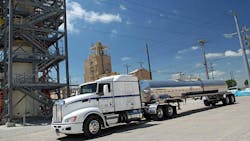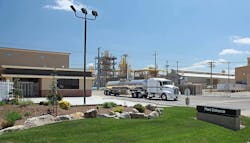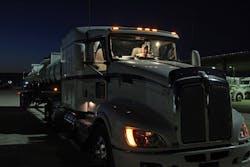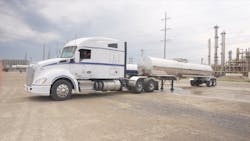Operation Safe Fleet: How Oxy built a winning private fleet
Moving hazardous chemicals is complex. But after 25 years in the U.S. Army, including the last 18 in Special Forces and time as an elite Green Beret, Kevin Crowder knows how to lead a complex operation to victory.
The Occidental Chemical truck operations manager took over in 2014 when the tanker fleet faced safety concerns. The fleet of 32 company drivers, who cover about 2.5 million miles annually, has just one recordable DOT accident in the past decade. That is among the reasons the Oxy operations won the 2025 FleetOwner Private Fleet of the Year Award for small carriers.
The bulk fleet specializes in transporting complex chemical products such as methyl chloride, chlorine derivatives, and hydrochloric acid—materials that require exceptional skill and precision.
“We’re not hauling Charmin,” Crowder told FleetOwner. “What we’re hauling is dangerous.”
Occidental Chemical facts and figures
Occidental Chemical, known as OxyChem, produces indispensable chemicals internationally. This small private fleet covers about 2.5 million miles annually, delivering products to customers across the U.S.
Parent company: Oxy
Private fleet size: 25+
Private fleet drivers: 32
Headquarters: Wichita, Kansas
Community outreach: Oxy is a founding member of the American Chemical Council, ensuring safe and responsible chemical companies' operations. It is a member of the Chlorine Institute, which provides safe transportation and utilization of chlorine. Oxy's private fleet participates in activities with its trucking associations in Kansas and Louisiana to give back to the communities where the private fleet is based.
Website: oxy.com
On-time delivery rate: 99.6%
Driver retention: 83%
DOT accident rate: 0 per million miles
Danger and unsafe driving don’t mix well. After Crowder took over managing the trucking operations, he schooled his company drivers on the Smith System for safe defensive driving. “I got one of my supervisors trained, and then we trained the whole fleet,” he said. “I think it just opened the guys’ eyes up to using the five keys of the Smith System. That has helped us avoid a lot of accidents.”
See also: 2025 FleetOwner 500: Private
Operation: Safe fleet
In the Special Forces, Crowder had missions leading teams tasked with protecting presidents in foreign countries and helping train other nations to fight terrorism. However, he refined his leadership approach for civilian life while working as a production manager for BASF before joining Oxy.
“It was a little tough when I first got out of being on a Special Forces A-Team with all Type-A personalities wanting to be the best of the best—then going into a plant with a union environment,” he recalled. “I had to shift my leadership style.
“My thing is if you take care of your people, your people will take care of you—and I think that goes a long way,” he continued. “I worked for a lot of different leaders in the military, and I swore I would never be a micromanager. If I have to put my foot down, I can put my foot down, but it’s going to be because you made me do it. I’m not going to be in your business every five minutes.”
Crowder said his motto is: “Do what’s right when nobody is looking and own anything in your realm. If something happens, even if it’s not your fault, you own it. I don’t have a zero-fault policy, but I do have a ‘don’t do it again’ policy. Learn from your mistakes and move on.”
That motto has helped him and his team build one of the safest small fleets in the nation. A rigorous training program beyond industry standards helps set up his drivers for success.
Tough training pays off
New drivers undergo four to six weeks of intensive on-the-job training with experienced driver mentors who help them learn every aspect of chemical hauling.
The financial investment is significant. "I'm paying double for that load," Crowder points out, as the trainer and trainee are both fully compensated. "But to me, that's why we don't have accidents. That's why we don't have spills."
Tough training, good pay, and healthy benefits have led to a stable driver workforce. Oxy also pays the drivers hourly when they are loading and unloading. And while the company doesn’t backhaul, the drivers get paid the same “when they come back empty.”
“Once we get them, we don’t usually lose them until they retire,” Crowder said. “We only have 32 drivers, but I’d say over half of them are over 20 years with the company.”
And it’s essential to have happy, experienced drivers because Oxy’s private fleet needs to be available to respond to needs that its third-party carriers cannot.
“We can react immediately to whatever the company needs to do,” Crowder explained why Oxy has this small, nimble fleet. “If a customer has a shutdown situation, I can go all over the U.S. and move my dispatch around where a third-party carrier couldn’t.”
That’s supported by a 24/7 dispatch operation so that when a customer calls, they reach another human immediately.
Looking ahead, Crowder and his team are not resting on their decade of success. He’s focusing on more technology investments, continuous training, and unwavering safety focus.
About the Author
Josh Fisher
Editor-in-Chief
Editor-in-Chief Josh Fisher has been with FleetOwner since 2017. He covers everything from modern fleet management to operational efficiency, artificial intelligence, autonomous trucking, alternative fuels and powertrains, regulations, and emerging transportation technology. Based in Maryland, he writes the Lane Shift Ahead column about the changing North American transportation landscape.




